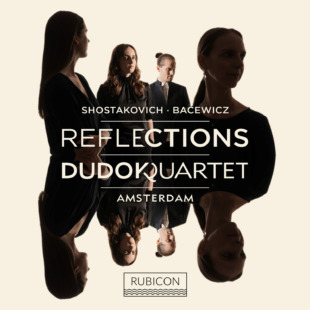
Reflections
Bacewicz and Shostakovich
Rubicon Classics RCD1099
This recording confirms the strong impression of the previous Brahms album. The Dudok Quartet really has something to say – and does so with an energy and dedication that is so gripping, even on a recording, that you feel as if you were sitting right in the middle of it.
Fono Forum, April 2023
The Dudoks deliver a rhythmically dynamic and wonderfully nuanced account of the Bacewicz. Their Shostakovich is also impressive, projecting tremendous power, ferocity and forward momentum in the outer movements and poignancy in the central Andante… their brilliant and witty arrangements of a selection of Shostakovich’s 24 Preludes deserve special praise for making such intrinsically pianistic music sound so idiomatic in this guise.
Erik Levi, BBC Music Magazine, February 2023
Shostakovich’s Fifth Quartet is, of course, a unified masterpiece, and the Dudoks clarify the thematic connections and returns in the most perfectly balanced of interpretations – bittersweet, fierce, singing and jabbing … the performance is everything, and simply perfect. The arrangements of seven of the earlier set of piano preludes by Faber and first violinist Judith van Driel – who makes them sound as if they were conceived for her instrument in the melody-lines in the first place – are also an ideal bridge, and the natural sound allows the textures to stay equal throughout. A winner.
David Nice, The Arts Desk, 14 January 2023
It is their versatile expressiveness that makes this such an appealing performance ****
De Standaard, 30 November 2022
Fevered and energetic, [the Shostakovich String Quartet’s ] qualities are incisively brought out by the Dudoks. Bacewicz’s three-movement Quartet No 4, written for the Polish Composers’ Union, reflects her own string-playing fluency – she was a violinist – as well as her fascination with folk songs and rhythms. Contrasts and echoes between the two are winningly explored by this fine quartet.
Fiona Maddocks, The Observer, 27 November 2022
There’s an energy and life that flows through these performances.
Andrew MacGregor, BBC Radio 3 Record Review, 26 November 2022
Fantastic quartet playing *****
Dagblad van het Noorden, 25 November 2022
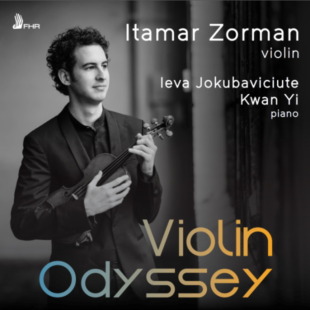
Violin Odyssey
Itamar Zorman violin
Ieva Jokubaviciute piano
Kwan Yi piano
First Hand Records FHR119
Violinistic byways brought to life with elan in this lockdown project… One of the three focal points is the set of eight movements adapted for violin and piano by Heifetz from The Children’s Suite for solo piano by Russian-born US émigré composer Joseph Achron. Zorman captures a folk flavour and simple innocence redolent of Bartók’s Six Romanian Dances.
Edward Bhesania, The Strad, August 2022
None of these pieces are everyday fare, yet Itamar Zorman… and his two distinguished pianist-partners, Ieva Jokubaviciute and Kwan Yi, play with such spontaneously intuitive flair and eloquence that they emerge sounding like bread-and-butter repertoire.
Julian Haylock, BBC Music Magazine, August 2022
I wholeheartedly concur with the impetus for this disc. One must regret the extent to which so many composers’ music is hardly known. Here is another demonstration that such people’s writing should be out in the world for all to hear. I also admire Itamar Zorman’s wonderfully evocative tone and skill, highlighted throughout the disc. He is more than ably accompanied by two wonderful pianists. They have produced a disc of really interesting and tuneful music that should spark interest in several lesser-known composers, so I say congratulations on a job well done!
Steve Arloff, Music Web International, July 2022
…a wide-ranging and entertainingly varied programme… Documentation here is first class and includes music examples and a reproduction of a relevant Revueltas manuscript. With a fine recording balance, too, this is a trip worth taking.
Jonathan Woolf, Music Web International, 14 June 2022
…the sonata [Schulhoff’s 2nd] is well worth hearing, with a slow movement that reaches deep into the emotions and dark into concurrent social undercurrents. Zorman’s imaginative fillers include a 1917 sonata by the Croatian Dora Pejačevic, Heifetz cuts from a suite by Joseph Achron and a moody snooze by William Grant Still. Go for it.
Norman Lebrecht, Ludwigvan, June 2022
a masterful young violinist from Israel who now teaches at the Eastman School of Music, Itamar Zorman, …goes on what he calls a Violin Odyssey, trying to find in many distant lands particularly remarkable pieces from the year 1900 onward. His taste is faultless: each piece quickly endeared itself to me…
Throughout this adventuresome journey, Itamar Zorman… plays with total command and subtle variety. Zorman gets first-rate support from his pianists: Kwan Yi in three pieces (Achron, Osman, Schulhoff) and Ieva Jokubaviciute in the rest.
Ralph P Locke, The Arts Fuse, 5 June 2022
Here, composers from literally the whole globe mingle: Gareth Farr from New Zealand, Gao Ping from China and Ali Osman from Sudan with dead Europeans like Grazyna Bacewicz and Dora Pejacevic… [I]t’s always interesting to hear what Zorman has been listening to… This is the violinist as an actor, constantly presenting new ideas… where all music must be equally important regardless of who wrote it and for whom it was written – it is the variety, and a friendly desire for openness which is the point.
Hanna Höglund, Sydsvenska Dagbladet, 3 June 2022
Pejačević’s Sonata for Violin and Piano No 2 is a ferociously powerful and spectacularly demanding work written in 1917. In this Sonata Zorman’s virtuosity dazzles as he flies through furiously fast passages, never once losing his commitment to the work’s emotional intensity.After an impassioned series of high energy recordings, the album closes with Summerland by William Grant Still. This work contrasts the majority of the album by showcasing a much gentler side to Zorman’s sound. Summerland is reflective and calm, transporting the listener to a world with much more peace and clarity. You can not help but wonder if this closing piece is in fact a reflection of Zorman’s hope for the future during what was an incredibly uncertain and turbulent time.
Rosie Olver, The Cusp, 28 April 2022
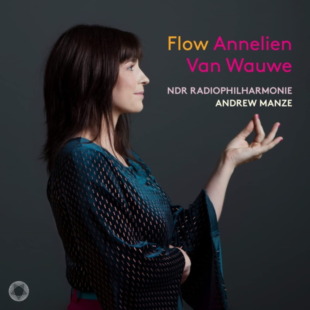
Flow
Wim Henderickx Sutra
Concerto for Basset Clarinet, Electronics & Orchestra
Mozart Basset Clarinet Concerto in A K 622
Annelien Van Wauwe clarinet
NDR Radiophilharmonie
Andrew Manze conductor
Pentatone PTC 5186-973
The purity of her tone is sustained, even when she switches from lyrical, ornamented features to more subdued moments… “The similarity between yoga and music is making a connection” – the musician succeeds wonderfully in this. During the recordings she literally stood among the orchestral players, so that her playing with and against the orchestra remains wonderfully natural. The power of that interplay flourishes especially in Wim Henderickx’s concerto. The warm tenor sound of the woodwind plays the leading role in a mysterious, Buddhist, symphonic sound world.
JC, De Standaard, 6 April 2022
The starting point for the effective composition are yoga sutras by Patanjali: Breath of Life, Meditation, Mind Concentration and Intense Spiritual Union. This results in an esoteric-mystical sound world, which is effectively presented by the performers.
Remy Franck, Pizzicato, 4 April 2022
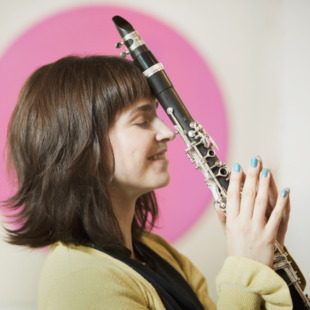
Wim Henderickx
Sutra Concerto for Basset Clarinet, Electronics & Orchestra
Annelien Van Wauwe clarinet
BBC Scottish Symphony Orchestra
Martyn Brabbins conductor
World première Glasgow 31 March 2022
Even if yoga’s not your thing, there was no mistaking the mystical, meditative quality of Sutra, its four interlinked movements encased in a sound world that is inwardly seductive and outwardly ethereal …Van Wauwe’s performance was thoughtful and quietly ravishing, the use of the mellower basset horn possibly instrumental in subduing her solo presence at times, yet in the third movement, a sidestepping frenzied scherzo, the awakening from the hypnotic inertia of the surrounding movements revealed a vital, energised side to the former BBC New Generation Artist. Conductor Martyn Brabbins found endless potential in Henderickx’s score, from its subliminal live textures to their magical integration with its spectral electronic backdrop.
Ken Walton, The Scotsman, 1 April 2022
There are a lot of different ingredients in the score, with many of the ideas coming from the soloist and dedicatee … she combines her musical practice with yoga tuition, and the disciplines of meditation and concentration are themes of the central two movements. Only in the third one did the work become at all virtuosic, with a step up in tempo, a speedy Ballkan melody line and a big band sound from the orchestra … He [Henderickx] also gave Van Wauwe plenty of opportunity to demonstrate the lower register of the basset clarinet, although the most attractive and exciting passages she had to play seemed to fall within the range of the regular instrument.
Keith Bruce, Vox Carnyx, 1 April 2022
It’s an atmospheric/suggestive score, of slow formations, otherworldly, involving evocative chanting from the soloist and some orchestra members, and hypnotic in effect, a variety of colours and details sustaining the thirty-minute-plus whole… and, to regulate the trance-like inducements, there is fast and fortissimo music, too, requiring virtuosity from all concerned – duly received – Van Wauwe’s basset cutting through with glee, the music dancing ecstatically, until a return to meditation and a fade to silence (or another dimension beyond our consciousness). Sutra is a fascinating listen.
Colin Anderson, Colin’s Column, Classical Source, 31 March 2022
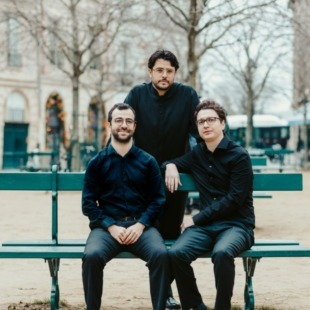
Francisco Coll Piano Trio
Trio Isimsiz
World première Madrid 24 January 2022
Coll’s piece is made up of four movements; extraordinary the first, curiously based on Strauss’s opera The Silent Woman; a second based on flamenco motifs …. [which are] very well resolved technically; and two last movements full of verve and magnificent details supported by dynamic contrasts. In short, an excellent work, that I see more as four small, almost independent, works.
Jorge Fernández Guerra, El Pais, 25 January 2022
Composed in 2019, [Coll’s Piano Trio] gives the impression that, throughout those four movements mentioned above, there is a stylization of elements, if not ancient, then at least earlier. Almost historical … whose values and intensity are very suggestive. To understand them in a single reading would seem too daring on our part. But a second hearing would certainly be very worthwhile, since it is loaded with ideas that make it especially interesting.
Santiago Martin Bermudez, Sherzo, 25 January 2022
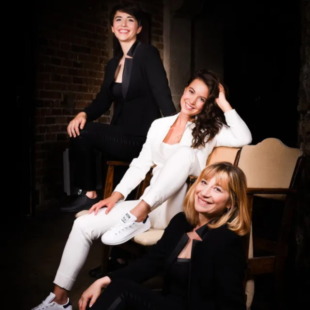
Kelly Marie Murphy
Triple Concerto When I Too Long Have Looked Upon Your Face
Trio Sōra
Orchestre Philharmonique de Radio France
Mikko Franck conductor
World première Paris 18 February 2022
– a score of great quality that creates three contrasting atmospheres and possesses a certain evocative power and mastery of the orchestra. The Trio Sōra … plays as a trio, rather than soloists playing in a trio, and they knew how to share their involvement and the pleasure they experienced with the audience
Cartouche, Premiere-Loge, 22 February 2022
The composer, who has an extensive sound universe, uses a rich and sometimes spectacular orchestral force that ensures dialogue with the intimacy of the Trio. Sōra’s instrumentalists are perfectly showcased individually and as a group. They have undoubtedly contributed to the success of this much appreciated world premiere.
Hugues Rameau-Crays, Classique – c’est cool!, 23 February 2022